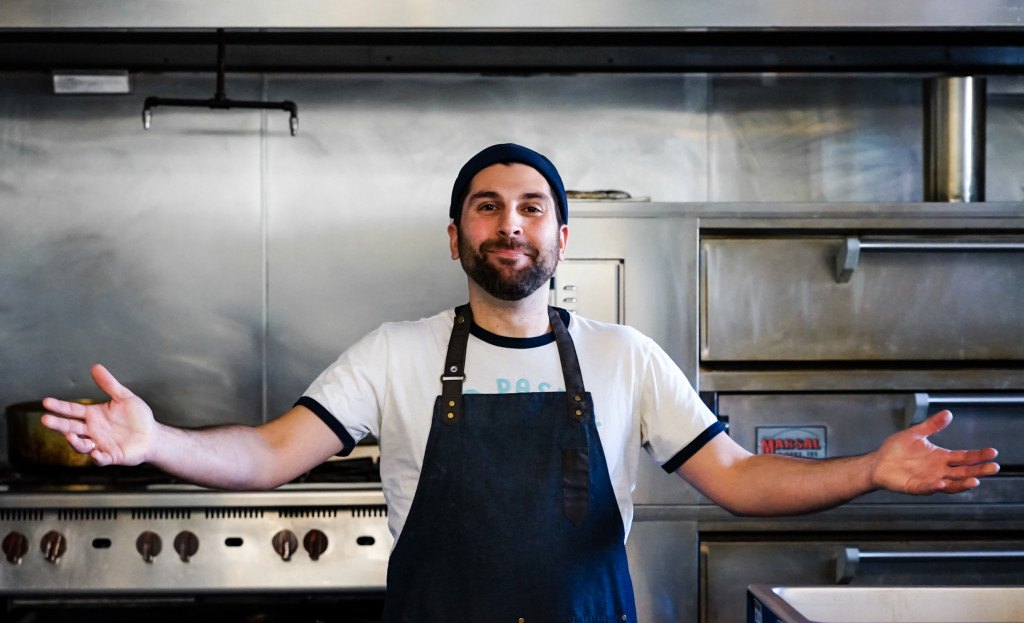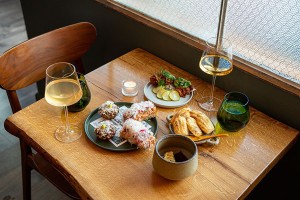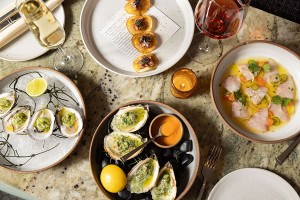A Professional Pastry Chef on How to Improve Your Homemade Baked Goods
How to master cookies, cakes, and other treats like a pro.

Chad Durkin, owner of Small Oven Pastries and Porcos Porchetteria, gives his baking tips. | Photo courtesy of Bondfire Media
We don’t often write about home cooking, but with restaurants reduced to takeout-only options, we want to continue to commune with our readers over food, which means celebrating the cooking that continues to happen in Philadelphia, both in restaurants and in homes. We’re working to keep you connected to your favorite chefs and restaurants, without needing to leave your own kitchen. So, until we can finally return to all those places that brought us joy, we’ll be publishing ways to bring that very same joy into your homes. This story is part of the Foobooz Guide to Home Cooking.
When Chad Durkin opened Small Oven Pastry Shop and Porcos Porchetteria, his combination pastry and porchetta sandwich shop, taking orders through a window to the street seemed like a fun twist and an easy way to control traffic. Now, it’s an essential part of what has allowed him to stay open through the coronavirus crisis, regularly selling out of everything from chocolate chip cookies to intricately decorated squares of strawberry shortcake. You can order Chad’s pastries for delivery or pick-up these days, but if you’re among the hoards of people clearing out the flour shelves at grocery stores across the city right now, Chad has some advice for you. As a veteran pastry chef and former pastry teacher, Chad says learning to bake can not only help you stay entertained in your house, it can make you a better savory cook, as well. Here are his five tips for better home baking.
1. Preparation is everything.
“In general, with baking, if you don’t have your ingredients in place, your success rate is reduced by like 50 percent. You want to make sure you have all of your ingredients measured out, you want to make sure you have everything you need in order to make the recipe. That way, when you get going, it’s easier to achieve the end result that you’re looking for. Taking the time in the beginning really effects your end-result. I think a lot of people think ‘oh, I’ve seen this made before, it shouldn’t be that hard’ and that kind of sloppiness can lead to a lot of mistakes.”
2. Embrace the scale.
“When I was teaching pastry back in the day, the first thing I would tell my students was to throw away their measuring cups. Those types of measurements are way too inconsistent for professional bakers. If you’re a new baker, weighing out all of your ingredients protects you from a lot of mistakes. All of our recipes at the shop are written down to the gram, and that’s intimidating to some cooks at first because they’re not use to it. But actually it’s easier because there’s less room for error. Anyone can do it. Plus, you also don’t have to worry about washing the measuring cups and spoons, because you’re just weighing everything in the bowl as you add it.
“If I measure a cup of brown sugar, and you measure a cup of brown sugar it will vary a lot. You might pack it in tighter, or I might heap the top of the cup measure more than you. In savory cooking, adding 25 or 30 percent more onion won’t ruin most recipes — it will make it taste more like onions, but the fundamental recipe will still work. But if you accidentally add 25 or 30 percent more flour to a baking recipe, it might completely throw off the chemistry that’s happening in that recipe and ruin your cookie or cake.”
3. Instead of becoming a jack of all trades, become a master of one.
“Instead of making, like, a hundred recipes and only two coming out well, pick one recipe to make over and over and make that a perfect recipe. Make a chocolate chip cookie, and then say ‘Ok, is this chewy enough? Is this chocolate-y enough? What do I like in my chocolate chip cookie?’ If you make the same recipe over and over with small tweaks, you’ll slowly create a catalog of all your best recipes, exactly how you like them. That’s how professional bakers develop their desserts, and it really helps you understand how to manipulate ingredients and know what they do in a recipe.I feel like this is really well-suited for quarantine as well, because if you get the ingredients for one recipe, you can make it over and over and not waste anything.”
4. Recipes are guidelines, ingredients are building blocks.
“For me a recipe is a guideline, and then it’s knowing what flour does, what sugar does, what butter does. Knowing what each ingredient means in a recipe — to me, if you understand that, you can make anything you want to make. There’s a foundation to pastry in the same way that there is for savory cooking. The best way to learn that is from a well-written cookbook. I like The Professional Pastry Chef by Bo Friberg.”
5. Don’t be afraid to ask questions.
“Especially nowadays, since most of these people are home just sitting around, don’t be afraid to reach out to chefs that you admire and ask them questions. If the person isn’t a prick, they’ll probably respond and give you some advice. Everyone wants to be connected right now and I think there’s a real opportunity to get over that sense of people being, like, untouchable.”


